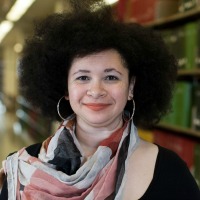Dorothy Berry is Project Manager and Metadata Coordinator at the University of Minnesota, and attended the 2017 DLF Forum as an HBCU Fellow. The award, which brought 24 fellows to the conference, was part of a collaborative effort with the HBCU Library Alliance, supported by a grant from IMLS.
In the past year I have been to so many conferences, I had to put a chart on my wall indicating when I would be out of state. It has been a whirlwind of professional development and networking, and by the time DLF came around I felt I was a fairly savvy attendee. With that humblebrag behind me, I have to say that this DLF conference was the best I’d attended by far. From the HBCU/LAC pre-conference to the diversity of session content in the regular conference, I left DLF with new insight into the field of digital libraries and, I dare say, with new friends as well.
I attended DLF on an HBCU Fellowship and was interested to learn from the experiences of professionals from HBCUs and LACs. I have only worked at major research institutions and don’t always have access to the perspectives of my colleagues at smaller colleges and universities. With the day broken up into democratically decided working sessions, I was delighted at the mix of experiences in every room. It seemed each session was filled with the perfect mix of technical know-how, instructional experience, traditional librarianship, and most importantly, good will.
My largest take-away from the first day came from a commenter whose name I’ve unfortunately not recorded. She stated, in the midst of a conversation about how to best facilitate digitization for under-resourced HBCUs, that it was important to remember that HBCUs are not in need of rescue from bigger institutions, but rather partners whose materials are equal to or greater in value than the technical resources provided by digitization partners. It is easy to think the solutions to problems is always to bring in more technology and more processes, but if that comes at the expense of healthy working relationships and true professional camaraderie, a real loss has taken place.
There was a great mix of sessions throughout the conference, appealing to professionals from a wide spectrum of backgrounds. Beyond the ability to shape an innovative conference track, there was a general feeling of social openness and consideration that led to learning opportunities on both the session level and the personal level. Although I am great at performing the role of a social bon vivant, I’m not naturally very outgoing. Throughout the conference the general atmosphere made me comfortable to approach strangers and talk about their interests and experiences. This is one of the greatest advantages of attending a conference in person, and an atmosphere conducive to friendly communication is not always easy to shape at a large and busy event.
On the last day of the conference, I was part of a light hearted conversation with friends from the archival community, joking wondering why none of us had been to DLF before and planning our next year’s attendance. In retrospect, the reason most of us were in attendance this year was the opportunity to be funded as fellows, and I believe the active role of the conference in seeking to put its money where its mouth is in terms of diversifying attendance is something to be taken up by professional organizations across the field.

